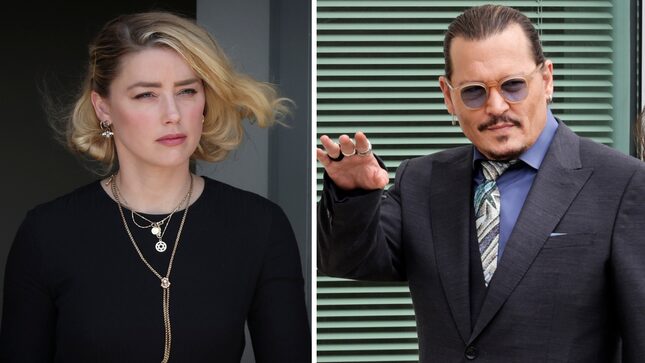Report Finds Evidence of Widespread, Anti-Amber Heard Online Harassment Campaign
One anti-Heard user “used a photo of a woman’s deceased child to create a fake account and troll the woman” over the woman's public support for Heard.
Entertainment

Weeks after the conclusion of Johnny Depp and Amber Heard’s defamation trial over Heard’s allegations that he had abused her, a new report confirms what many of us witnessed or even experienced firsthand: Users who posted anything even vaguely supportive of Heard on social media were subjected to a deluge of online harassment, often from newly created accounts specifically dedicated to vilifying Heard. Per a report from research firm Bot Sentinel released on Monday, analysis of more than 14,000 tweets that included one of four viral hashtags (#AmberHeardIsAnAbuser, #AmberHeardLsAnAbuser, #AmberHeardIsALiar, and #AmberHeardLsALiar) characterizing Heard as deceptive or abusive of Depp revealed that 24.4% of accounts tied to these tweets were created just months ago. One in five of the accounts appeared to be “dedicated to spamming.”
The report also analyzed different methods deployed by aggressive pro-Depp accounts, including doxxing and what the firm called “copypasta,” or repeatedly copying, pasting, and tweeting identical content attacking Heard and her supporters. People who expressed support for Heard, or merely expressed that they believed her allegations, “were attacked relentlessly” with tweets using particularly “vulgar and threatening language,” the report said. Not-so-shockingly, “misogyny, doxxing, and death threats were rampant.”
According to Bot Sentinel, one anti-Heard user “used a photo of a woman’s deceased child to create a fake account and troll the woman,” solely because of her tweets in support of Amber Heard. These trolls “didn’t limit their abuse to women” who supported the actress—they “also targeted their family members.”
One user, Ella Dawson, told CBS that nearly two months after the verdict of the trial, she’s “still getting people tweeting at me, calling me weird, heinous stuff” over tweets she shared that were supportive of Heard and other domestic violence victims. “It’s been weeks and weeks,” Dawson said, and she remains “bombarded by people every day for weeks on end saying that Amber Heard is a liar and women lie, and I am an abuse apologist who must be lying.”
-

-

-

-

-

-

-

-

-

-

-

-

-

-

-

-

-

-

-

-

-

-

-

-

-

-

-

-

-

-

-

-

-

-

-

-

-

-

-

-








































